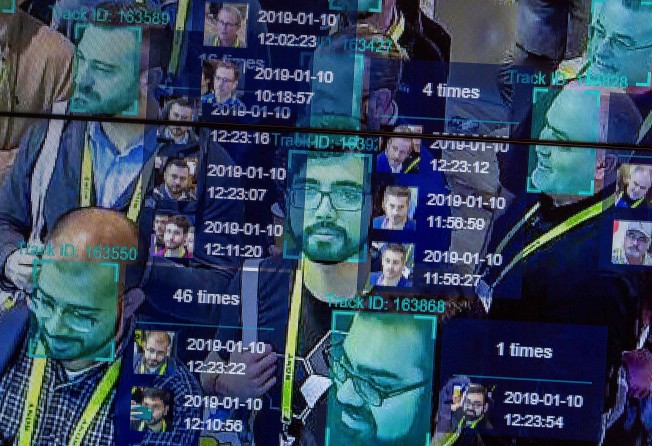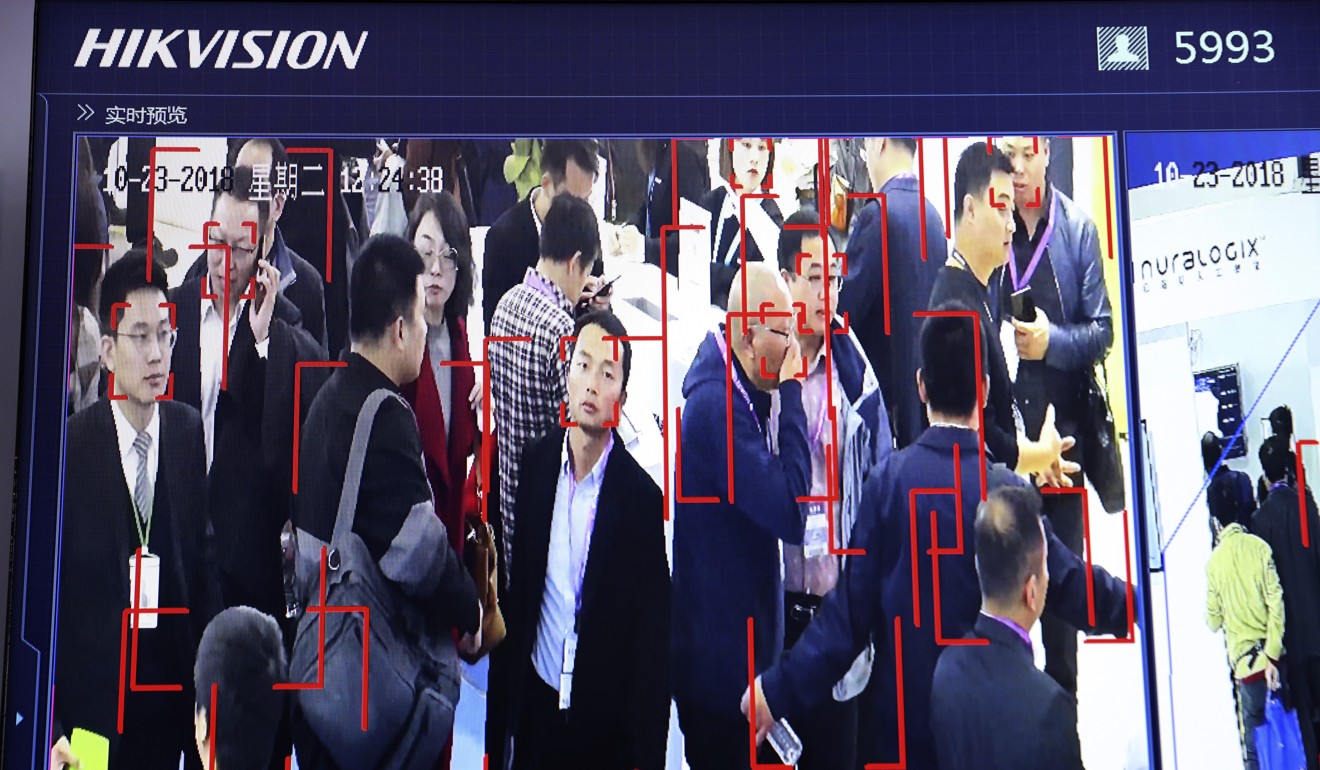How the US plans to crack down on Chinese facial recognition tech used to ‘strengthen authoritarian governments’
- A proposed bill reflects a broader campaign underway in the US to check the spread of Chinese tech
- Hangzhou-based Hikvision, for example, has been criticised for its role in the detention and surveillance of the Uygur minority population in Xinjiang

A United States senator is pushing to ban countries including China from an influential US government accuracy test of facial recognition technology, potentially opening up a new front in the escalating tech war between Washington and Beijing.
Democratic Senator Brian Schatz of Hawaii has proposed the “End Support of Digital Authoritarianism Act” to bar companies from China, North Korea, Russia, Iran and other countries that consistently violate “internationally recognised human rights” from the Face Recognition Vendor Test (FRVT), which is widely considered the gold standard for determining the reliability of facial recognition software.
The results of the FRVT are regularly cited by firms as a measure of their credibility, and are referred to by businesses and policymakers when buying facial recognition technology.
Schatz’s bill, which is in the drafting stage, was in May sent to the Maryland-based National Institute of Standards and Technology (NIST), which conducts the FRVT, to seek feedback.
The South China Morning Post obtained a copy of the bill via a Freedom of Information Act (FOIA) request with the NIST, which operates under the US Department of Commerce, seeking documents addressing concerns associated with testing Chinese facial recognition technology.
Schatz, an increasingly influential figure within his party whose proposals have been embraced by Democratic presidential candidates, including Kamala Harris and Elizabeth Warren, did not respond to repeated requests for comment.
There are multiple steps before a bill goes to a vote at the House of Representatives and Senate, and according to GovTrack, a Washington-based website that tracks Congress, fewer than 5 per cent of bills become law.
But Schatz’s initiative reflects a broader campaign underway in the US to check the spread of Chinese technology, based on claims it poses a threat to national security, and coincides with rising anxiety in the US about the country’s fading dominance in the tech sphere.
Both China and US are trying to increasingly regulate their technological fortresses
“Both China and US are trying to increasingly regulate their technological fortresses,” said Michael Raska, an assistant professor at S. Rajaratnam School of International Studies in Singapore. “This means narrowing down the choices for critical digital infrastructure suppliers, including those providing algorithms for facial recognition.”
Sourabh Gupta, a resident senior fellow at the Institute for China-American Studies, said the Chinese were ahead of the curve in the artificial intelligence arms race.
“In the short run, snapping links such as Chinese researchers’ participation within NIST’s FRVT programme, and down the line perhaps temporarily hamstringing China’s computer vision companies, might seem self-satisfying,” Gupta said. “But the long-term informational and hard dollar profits-related damage that could ensue might turn out to be significant.”
Timothy Heath, a researcher at the Rand Corporation, said the bill reflected bipartisan concern surrounding the Chinese government’s use of digital technologies on its citizens.
“The bill also reflects concern in Washington about the spread of such technologies around the world, which further promotes authoritarian rule and weakens protections for the privacy and civil rights of people around the world,” Heath said.
A NEW TARGET
In May, the US government effectively blacklisted Huawei by requiring US firms to obtain special approval to use the Chinese tech giant’s products or supply it with US-made components. It has also put pressure on its allies to limit or ban Huawei’s participation in their superfast 5G communications networks.
China’s facial recognition technology firms, widely considered superior to others, look to be next in line for such curbs, according to US media reports.
These firms have in recent years ranked among the strongest performers in the FRVT, which comprises a number of different assessments of facial recognition technology.
Dozens of countries – including Singapore, Thailand, the Philippines, Pakistan, Zimbabwe and Ecuador – have bought their products for uses ranging from police body cameras to “Safe City” CCTV networks.
In 2018, five Chinese companies, including Shanghai-based YITU Technology and Beijing-based SenseTime, took up the top five spots in an assessment of facial recognition algorithms. Chinese suppliers of facial recognition technology and Chinese state media have touted the rankings as proof of China’s prowess in the field.
Lately, though, US media reports have indicated Donald Trump’s administration could impose similar restrictions on the developers of such products to those placed on Huawei.
This has not been received well by the Chinese tech sector, said Qi Deng, a professor researching artificial intelligence and deep learning at Xi’an Jiaotong Liverpool University in Suzhou.
Deng said Chinese tech companies have historically built upon fundamental technology developed in the US, but efforts to curb Chinese tech development have reinforced the view China must stand on the strength of its own technologies.
“The US effort to block Chinese tech only makes that view stronger,” he said.

On Wednesday, Republican Senator Marco Rubio, one of the most influential China hawks in Congress, sent a letter to New York-headquartered MSCI, a global index compiler, asking it to justify its investments in Chinese firms including Hikvision, a video surveillance provider.
The Hangzhou-based company, which has exported its facial recognition technology to countries including Singapore and Zimbabwe, has been criticised for its role in the detention and surveillance of the Uygur minority population in Xinjiang.
Beijing has denied mistreating the mostly Muslim minority, insisting it merely provides vocational training to people at risk of violent extremism.
Schatz’s draft also has a clause requiring the secretary of state and secretary of commerce to submit a report within 12 months examining how foreign governments use facial recognition and other artificial intelligence technologies for authoritarian purposes.
“The mood in DC and the country has really changed in ways that aren’t reported in the Chinese press, so more constraints and conflict are inevitable,” said James Andrew Lewis, senior vice-president at the Centre for Strategic and International Studies in Washington.
“Facial recognition is a bit more complicated, as there is not the same level of unanimity about how to regulate its use, but there is unanimity about blocking Chinese technology – people look at Xinjiang and see that as part of the problems with facial recognition technologies.”
THE MOOD IN WASHINGTON
To become law, the draft bill would need to be first formally introduced in Congress, where it would be assigned to a relevant Senate committee for scrutiny. If approved at the committee stage, the bill would be debated in the Senate, where it could be amended, before going to a vote. The Senate and House of Representatives both have to approve a bill before it is sent to the president to sign into law.
The NIST declined to comment on whether it supported the draft bill or had recommended any changes as part of its consultation.
In an email to colleagues, obtained as part of the Post’s FOIA request, Linda D. Acierto, deputy director of the Office of Congressional and Legislative Affairs at the NIST, said concerns about “foreign bad actors” having access to the FRVT would be a “recurring concern”.
Acierto and her colleagues had the “exact same conversation” during a hearing by the Senate Commerce Committee hearing in April, she said, according to the email.
Yun Sun, a senior fellow at the Stimson Centre, agreed suspicion of China’s facial recognition technology was now almost unanimous in Washington.
“In particular, the fact that China – Chinese companies – are exporting these technologies and equipment to other countries to help those authoritarian governments to strengthen their rule is particularly troubling,” Sun said. “I have no question that the legislation will be popular.”
Gupta said there was a powerful consensus in Washington on the need to challenge Beijing.
“The mood in Washington on digital privacy issues is sour,” he said. “The mood in Washington on China ties is bellicose. And the mood in Washington on science and high-technology collaboration with China is absolutely toxic. Put the three together and it seems clear to me that the bill, whichever legislative vehicle it might get folded into, will see light of day as law.”
Additional reporting by Meaghan Tobin